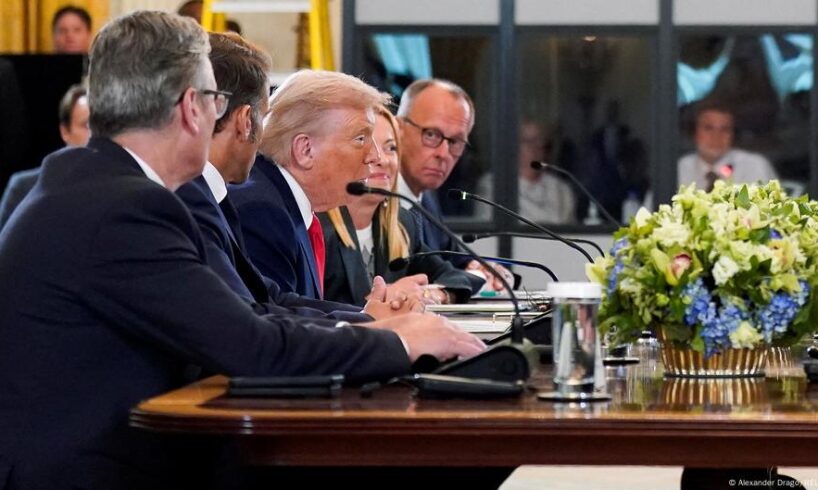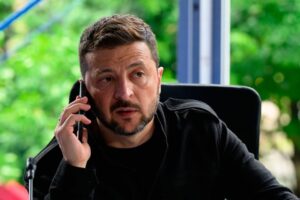
All participants agreed that the meeting in Washington was held in good faith. US President Donald Trump had invited high-ranking representatives of the EU, NATO and Ukrainian President Volodymyr Zelenskyy to Washington to talk peace in Ukraine.
German Chancellor Friedrich Merz expressed his overall satisfaction with the summit.
“It could have gone differently. But my expectations have not only been met, they have been exceeded,” said Merz in Washington after the end of the discussions.
The chancellor stated, however, that a summit between Zelenskyy and Vladimir Putin would have to be carefully planned.
“We don’t know whether the Russian president will have the courage to attend such a summit. Therefore, persuasion will be needed,” added Merz.
German Chancellor Merz stresses need for Ukraine ceasefire
To view this video please enable JavaScript, and consider upgrading to a web browser that supports HTML5 video
A ceasefire or immediate peace negotiations?
The EU-US summit did demonstrate a partial agreement between the US and Europe. However, it also became clear that the US and Europe have different ideas about the path to peace in Ukraine. President Trump is aiming for a comprehensive peace agreement, while he believes a prior ceasefire is unnecessary.
The Europeans have taken a completely different view. Chancellor Merz was very clear in the public discussion he had with Donald Trump. He vehemently called for a ceasefire as a starting point for further negotiations.
“To be honest, we all would like to see a ceasefire,” said Merz.
He said that he could not imagine that the next meeting would take place without such an agreement. The credibility of further negotiations depended on this issue.
In an interview with DW, security expert Rafael Loss from the think tank European Council on Foreign Relations (ECFR) explains that differences in approach between the US and the EU could cause conflict: “There are obviously very different expectations as to how talks should be approached. Donald Trump is much closer to Vladimir Putin on this issue when he says we have to resolve the big issues first.”
What could security guarantees for Ukraine look like?
Ukraine is afraid that Russia will continue its attacks even after a ceasefire or peace agreement has been reached. During the Crimean conflict in 2014, Putin repeatedly ignored agreements and continued to send troops.
The US president has remained rather vague when it comes to security guarantees. In this regard, Trump said, the Europeans are “the first line of defense.” But Washington would also do its part, the president added.
Assurances for Ukraine along the lines of Article 5 of the NATO Treaty have been floated.The members of the defense alliance promise to support each other in the event of an attack: “An armed attack against one or more of them in Europe or North America shall be considered an attack against them all.”
The idea to extend such assurances to Ukraine outside of NATO was put forward by Italian head of government Giorgia Meloni, who has a close relationship of trust with President Trump.
Who can provide security guarantees for Ukraine?
To view this video please enable JavaScript, and consider upgrading to a web browser that supports HTML5 video
Peacekeeping troops for Ukraine — including German troops?
Security guarantees could also mean that Ukrainian troops would be supported by soldiers from the EU or NATO to secure a possible peace agreement.
For some time now, France and the UK have been discussing the possibility of European peacekeeping troops for Ukraine. Following the summit, Merz left open the question of whether Germany would participate.
“It is too early to give a definitive answer,” the chancellor emphasized. He said it would have to be discussed with his governing coalition back in Berlin. This would also include the question of whether the Bundestag would “have to take decisions that require a mandate.” A vote in the Bundestag is currently required to decide on foreign deployments of the Bundeswehr.
In an interview with DW, security expert Loss explains that various models for a security operation have been discussed in the EU. Realistically, this would include the training of military personnel in Ukraine as well as logistical support from the navy or air force.
However, Loss also said that German “boots on the ground would be logical, considering that Germany is the largest country in Europe. In this respect, Germany does bear some responsibility. I think it would be a mistake to rule it out from the outset.”
Differing views on German ground forces
Adis Ahmetovi, a foreign policy expert from the center-left Social Democratic Party (SPD), a coalition partner to Merz’s conservative bloc of Christian Democratic Union and Christian Social Union (CDU/CSU), is open to the option of the German armed forces participating in a future peacekeeping mission in Ukraine.
On X, the leader of the Alternative for Germany (AfD) and opposition politician Alice Weidel warned that Germany could become a target itself if the US withdrew and then demanded: “Germany needs reconciliation with Russia instead of permanent confrontation.” Left Party leader Jan van Aken, on the other hand, brought up the possibility of a UN peacekeeping force of 30,000 to 40,000 soldiers as a security guarantee for Ukraine.
Is mandatory military service on its way back in Germany?
To view this video please enable JavaScript, and consider upgrading to a web browser that supports HTML5 video
Chancellor Merz made it clear at the beginning of his term that he places great importance on foreign and defense policy in these turbulent times of war against Ukraine. It was Merz who organized the meeting the previous week in preparation for the Alaska summit.
Merz has come to be the leader of the European community. Shortly after being elected Chancellor, he traveled to Kyiv together with other European politicians to show solidarity with Ukraine. The first meeting with the US president in June 2025 was also a success for Friedrich Merz, who was obviously able to develop a rapport with the American president. Praise for Merz’s decisive commitment to a resolute German foreign policy, which many had missed under his predecessor Olaf Scholz (SPD), even came from opposition parties.
Security expert Rafael Loss also assessed Merz’s political actions towards peace in Ukraine as “positive.”
“He certainly has a special way of dealing with Donald Trump, as we have seen in recent months,” Loss said. “But Merz [also] considers himself to be closely aligned with his European colleagues, articulating a European stance together.”
This would also include the question of whether a vote in the Bundestag would have to take place in order to decide on foreign deployments of the Bundeswehr.
This article was originally written in German.
While you’re here: Every Tuesday, DW editors round up what is happening in German politics and society. You can sign up here for the weekly email newsletter, Berlin Briefing.





